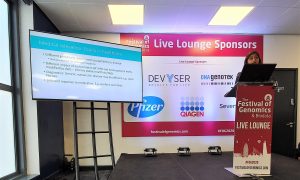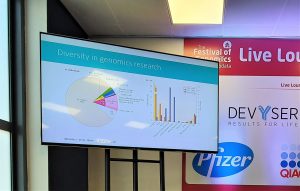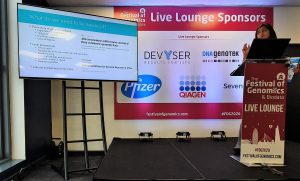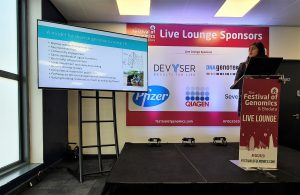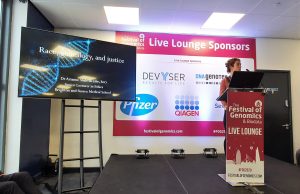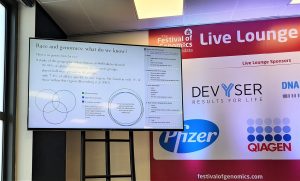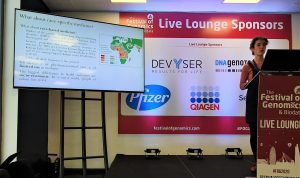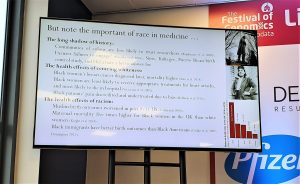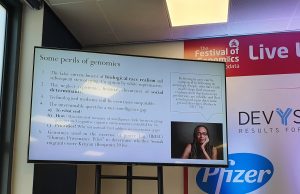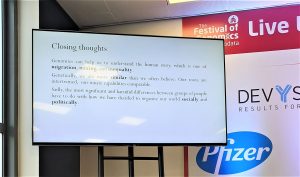Genomics for all #FoG2020
A large section of Day 1 of the Festival of Genomics was focused on The Social Genome with both researchers and philosophers speaking.
- Genomics and Diversity: The Impact of Engaging/Listening – Deepti Gurdasani, William Harvey Research Institute, Queen Mary’s
- Gender, Genealogy and Justice: Who is Genomics for? – Arianne Shahvisi, Senior Lecturer in Ethics, Brighton & Sussex Medical School
- Insights and Challenges of African Genome Resource for Precision Medicine – Segun Fatumo, Assistant Professor, London School of Hygiene & Tropical Medicine
The importance of diversity in genomic research
There is a lot of genetic difference between African and non-African populations. As a result of these differences the genetic research that underpins things such as polygenic risk scores, established using a European population, is biased, especially towards the African population. Genetic drift means it is also easier to identify causal variants in African populations compared to European populations.
Currently about 79% GWAS participants are of European descent despite being only 16% of the global population. Increasing the diversity of genomes available will enable us to get more from research and provide more equitable healthcare. Different populations may have:
- Different genetic markers for diseases like cystic fibrosis
- Different responses to medications like warfarin
- Different genetically determined susceptibility to disease
- Different environmental impacts
Personalised over race-based
Race in addition to gender is one of the most used forms of human categorisation. That’s how we both consciously and sub-consciously categorise ourselves and the people around us. However, race is a social concept and form of categorisation. There is no genetic basis for race and our way of thinking needs to move away from race-based research, to genomic research for personalised medicine. Dr Arianne Shavishi spoke about how self-identified or physician-assumed race is of limited use in medicine and the biggest differences in health outcomes are usually socio-economic; a result of a racist-world where people of colour fare worst.
The current research environment and barriers to diversity
There are barriers at every stage in the research environment to building a model for diverse genomic research.
- Diversity among researchers is low and not representative of the populations involved in genomics research
- Funding cycles are short and investment is usually only readily available for quick studies that have a high impact
- Often the ethical frameworks and available infrastructure such as labs and methods of data storage do not exist in many countries, for genomic research
- Methods of results feedback via trained personnel and the clinics and infrastructure to then manage care afterwards are scarce
- Historic and ongoing misuse of research has created a lack of trust and wariness of genetics within many groups
How do we move forwards?
There is a lot we can do to try and rectify the lack of diversity in our genomic research:
- Increase the diversity of researchers – greater diversity in researchers leads to greater diversity of participants
- Use the same ethical frameworks as you would when conducting research in the UK. This will also help to rebuild trust that may have been lost between communities and researchers
- Include locals in the data collection and analysis. The local community needs to gain something from the research as well
- Be aware of the fact that it will take longer to collect data in some places compared to the UK, this is no reason to cut corners in regards to ethics and consenting. 60% Africans live in rural areas, they are more likely to be poor and have limited access to health and education. They will still need everything explained to them and appropriate consent taken
There is still a lot of work to be done to make genomic data representative of the global population but by identifying the above issues we have taken the first step to rectifying the situation.

